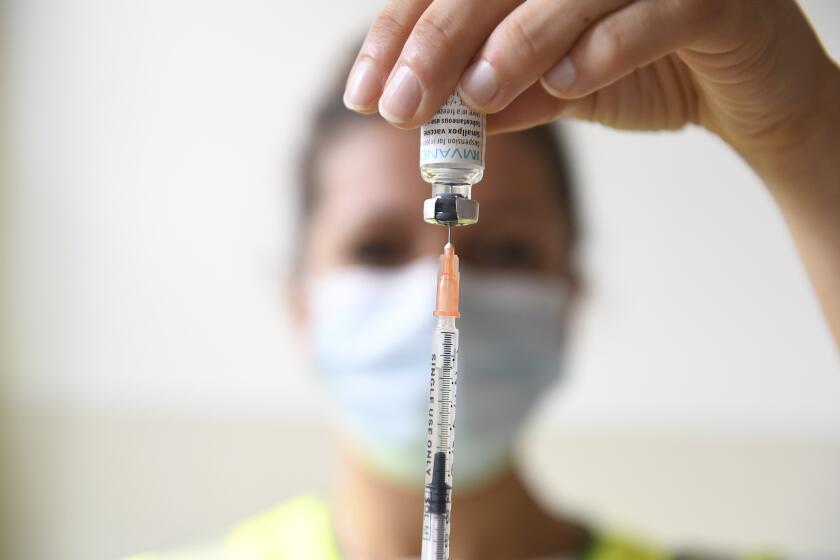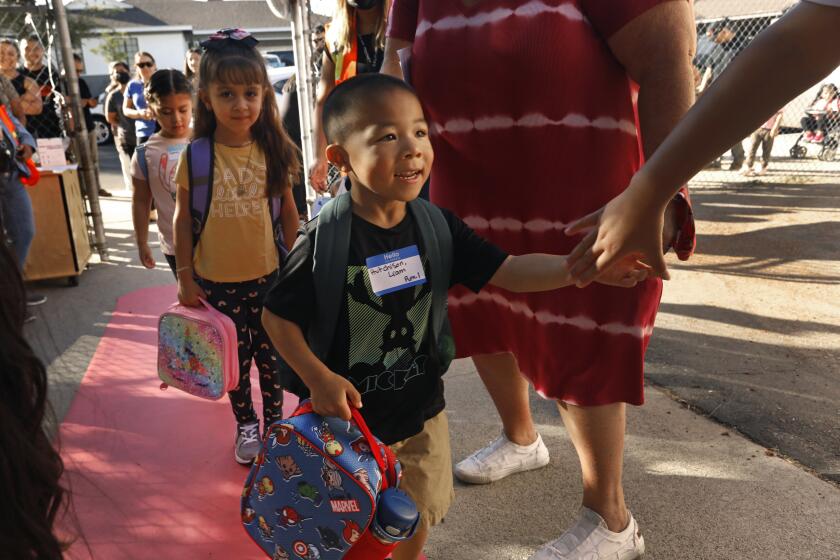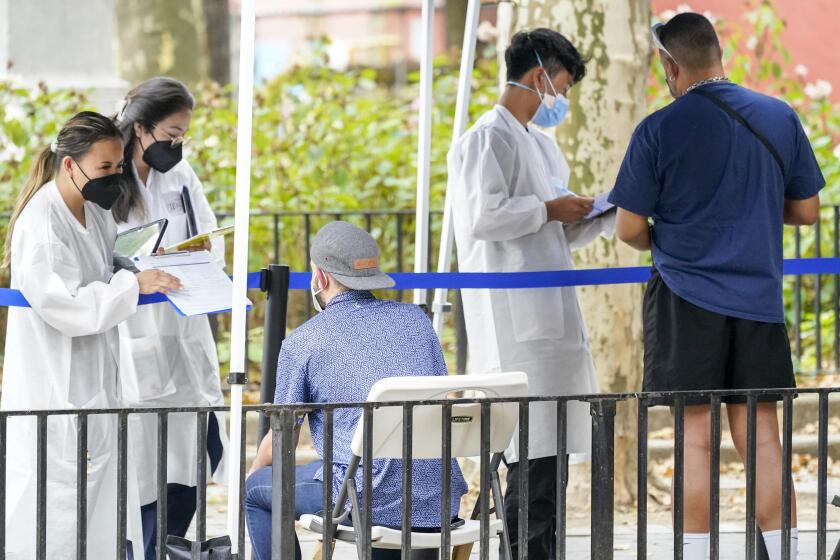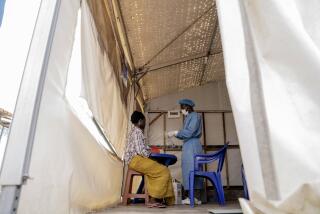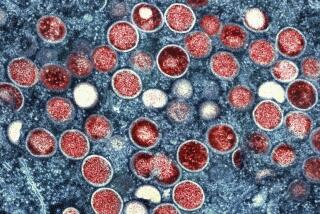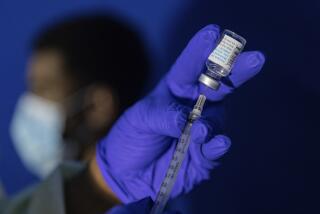As L.A. schools return, should monkeypox be a concern for students, staff?
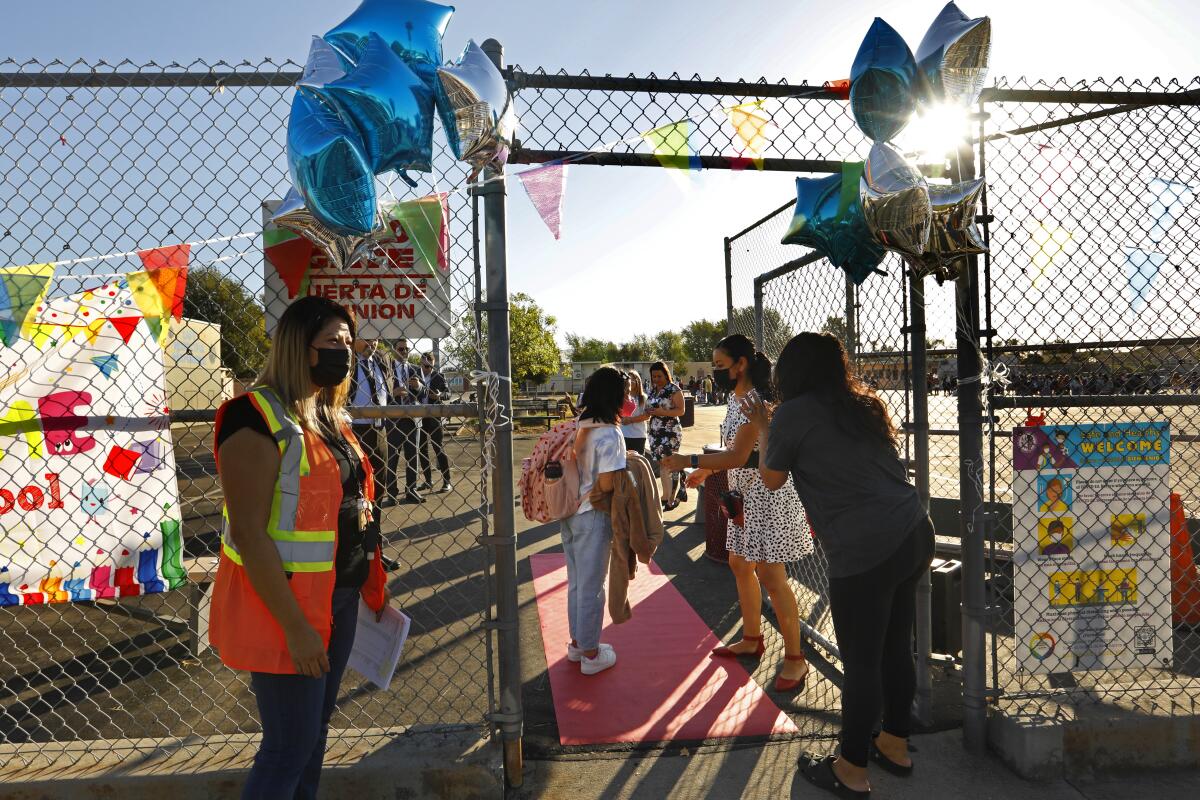
With many Los Angeles County students returning to school this week and thousands of young people headed back to California universities this month and next, there’s a rising concern about the potential for monkeypox outbreaks in academic and social environments.
But public health experts continue to assure parents and families that the risk for the rare illness remains low for most people, especially in clothed, mostly distanced settings, such as schools.
“I want to emphasize that the risk of monkeypox in the general population remains low,” said Dr. Rita Singhal, chief medical officer for the Los Angeles Department of Public Health. “Brief interactions such as casual conversations or walking by someone with monkeypox pose low risk.
“The risk of spread is minimal from attending an event with fully clothed people, traveling with others on a plane or public transit, swimming in a pool, hot tub or body of water or going to a public setting such as a grocery store, restaurant or to school,” she said.
As monkeypox cases across California and the U.S. continue to rise, experts address some of the concerns and questions swirling about virus, and what activities people should consider risky, or not.
There have, however, been at least two monkeypox cases confirmed in L.A. County children, the first of which was reported earlier this month in Long Beach. Officials said that case was linked to another household member and the child has since recovered.
Details about the other juvenile case, which Singhal announced Thursday, including the age of the child and the extent of the illness, were not immediately released.
While cases in children remain rare, monkeypox infections among adults in L.A. County continue to rise, increasing by 100 over the weekend to more than 900 confirmed or suspected cases Monday, according to data from the public health department. The vast majority of cases have been in men ages 18 to 49 who identify as part of the LGBTQ community, according to county data. Those demographics are consistent with the global outbreak of monkeypox, which is primarily infecting men who have sex with men as well as transgender and nonbinary people who have sex with men.
The illness, however, can spread to anyone regardless of gender or sexual identity, through close, skin-to-skin contact. The virus also can be spread through bedding or towels that touched an infectious skin lesion or pox.
Unlike the coronavirus, monkeypox is not believed to be spread through the air, and it is rarely fatal. No one in the U.S. has died from the monkeypox virus, although some people have been hospitalized, including at least 15 people in L.A. County, health officials said.
“Monkeypox is a concern for public health, but we have to be clear that monkeypox is not COVID-19; it’s not as easily transmissible as COVID-19,” said Dr. Smita Malhotra, medical director for the Los Angeles Unified School District.
She said district schools are following recommendations from the county public health department on monkeypox, which includes taking precautions if someone might be sick or exposed and monitoring for possible symptoms.
Monday is Day 1 for L.A. Unified, the nation’s second-largest school system, as the school year begins across California.
“The biggest message that we’re sending to everyone is, if your child is sick, keep them home,” Malhotra said. “Get them evaluated by their healthcare provider, and that is our best prevention against transmission in schools.”
Barbara Ferrer, director of the county’s public health department, said parents should monitor any new rashes, but said “the risk of monkeypox in children is currently extremely low.”
“There are many common rashes in children,” she said. “However, parents should contact their child’s pediatrician or medical provider if any new unexplained rash appears. The child [should] be kept at home and their rash covered until the doctor is consulted.”
Ferrer said it’s important to continue practicing good hand hygiene and help children avoid touching any rashes they may have.
LAUSD Supt. Alberto Carvalho said the district is prepared with additional protective equipment, including masks and gloves, if necessary.
“We continue to stress the importance of washing hands and maintaining a social distance, [and] we are not relaxing on the availability of hand disinfectants,” Carvalho said. “Those are all protective measures that will continue to be in place at our schools.”
Who is eligible to get the monkeypox vaccination in Los Angeles right now? And how to do you get one? Here’s what to know.
On many college campuses, including UCLA, USC and Cal State Long Beach, officials have sent out updated guidance and information on monkeypox as students prepare to return, alerting them about the risk of the virus, its symptoms and available resources.
Monkeypox vaccines remain in limited supply and are available to a limited group of people whom public health officials have deemed most at-risk. UCLA said it is working with the county public health department to vaccinate eligible high-risk populations and provide testing, and also is “developing isolation protocols for students who become infected with monkeypox.”
Officials at Cal State Fullerton have not yet sent out guidance to students on monkeypox but said the university’s website will have a page on the outbreak by Wednesday, when the fall semester begins.
“We recognize the need for increased education, vaccination and testing,” said Ellen Treanor, chief communication officer for the campus.
More to Read
Sign up for Essential California
The most important California stories and recommendations in your inbox every morning.
You may occasionally receive promotional content from the Los Angeles Times.
